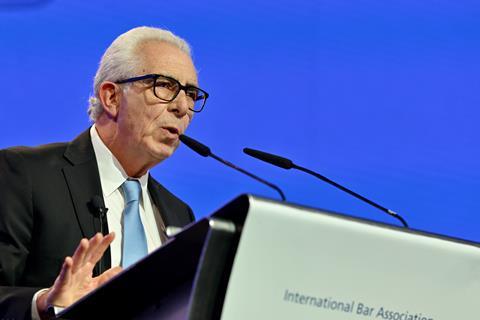As the IBA annual conference began amid a chorus of opposition to the government’s reforms of the judiciary, a former president of Mexico railed against this threat to the country’s ‘fragile rule of law’
The International Bar Association picked an interesting day to open its flagship annual event in Mexico City. Not only was last Sunday the eve of the country’s Independence Day national holiday, it was also the day the Mexican government’s constitutional reform package on the judiciary officially took effect. Arrivals at the conference opening event were greeted by a noisy band of demonstrators – including judges who have been on strike since August – waving national flags and banners saying ‘no to absolute power’.
If the demonstrators were in any doubt about the sympathies of their international colleagues, the conference’s opening session would have set them right. In an unprecedented move, the entire opening session was dedicated to criticism of the host government’s policy, culminating in an impassioned attack by a former president of Mexico. They reflected widespread international concern about the direction being taken by a country seeking to establish itself as a democratic economic powerhouse.
The judicial reforms were announced earlier this year by president Andrés Manuel López Obrador following a long and bruising row with a judiciary he describes as elitist and corrupt. He appears to enjoy widespread popular support: the ruling left-wing Morena party romped home in elections in June.
'Some countries have totally departed from democracy – Venezuela, Nicaragua, Bolivia – while the erosion of democracy and of the rule of law is quickly spreading to other countries: Ecuador, Colombia'
Almudena Arpón de Mendívil, IBA president
Under the reforms, the entire federal judiciary, including that of the 11-member Supreme Court, will be dismissed and replaced by judges picked by popular vote from a government-approved list. Their behaviour will be regulated by an elected Judicial Discipline Tribunal with broad powers to supervise and sanction – and to set deadlines for cases.
Welcoming delegates, IBA president Almudena Arpón de Mendívil, who practises in Madrid, set the tone by portraying the reform plan as a threat to Mexico’s road to democracy. In the Latin American region, she said, ‘some countries have totally departed from democracy – Venezuela, Nicaragua, Bolivia – while the erosion of democracy and of the rule of law is quickly spreading to other countries: Ecuador, Colombia’.
Mexico, ‘which has for years been the nation within the region to look at’, appears set to go down the same road, she said. To a standing ovation, Arpón de Mendívil presented the association’s first annual ‘Impact Award’ to the president of Mexico’s Supreme Court, Norma Lucia Pina Hernandez, who has led judicial opposition to the reforms.
For her part, Pina said she recognised that some reform is needed to a sclerotic justice system. However, this must be a comprehensive reform, ‘one that strengthens the entire justice system and its key actors, in order to provide a better service to society, in a prompt and expeditious manner’. Without a solid foundation, ‘no matter how many modifications are implemented, the structure will eventually give way’, she said.

The real fireworks, however, came in a speech by Ernesto Zedillo Ponce de León, president of Mexico from 1994 to 2000. Yale-educated Zedillo broke IBA convention by addressing the hall in Spanish, presumably for the benefit of the local press who were there in force. He opened by stating that he was breaking a self-imposed rule of not publicly commenting on political events in Mexico, justifying the decision by the fact that congress and state legislatures had ratified a set of constitutional reforms ‘that will destroy the judicial branch and, with it, bury Mexican democracy and what remains of its fragile rule of law’.
Appointing judges by election – a process he described as ‘a grotesque farce’ – will make the judiciary beholden to political power rather than the rule of law. They will owe their place in the judicial system to their political patrons ‘as well as to other questionable promoters who could well be criminals who financed or supported their campaign’, he said.
His description of the reforms as ‘a historic felony which seeks to transform our democracy into tyranny’ won another standing ovation.
But for all the passion of the legal community, both within Mexico and globally, the reforms appear to be a done deal. In a further development this week, Mexico’s National Human Rights Commission reported that, after carrying out an analysis of the judicial reform, it will not challenge the measure’s constitutionality.
What happens next? In less than two weeks, president López Obrador steps down in favour of Claudia Sheinbaum, the country’s first woman president. Arpón de Mendívil, herself only the second female IBA president in the organisation’s three-quarters of a century history, offered a warm sisterly welcome – and a challenge. 'What an unique occasion for the president elect to showcase the qualities that have led her to her unprecedented victory: wisdom, independent judgement, leadership and courage, the courage to overcome adverse times governing a country with the huge potential Mexico has, under the rule of law.'
At the moment, however, the future of judicial independence and the rule of law in the world’s 11th-largest economy can only be described as precarious.
This article is now closed for comment.
































1 Reader's comment